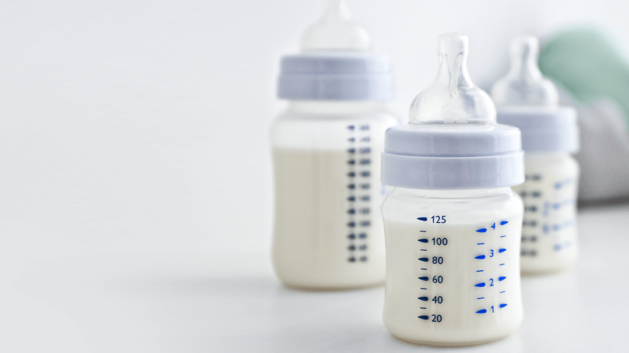Introducing bottle feeding after breastfeeding

As a breastfeeding mum, you might sometimes need to be away from your baby. In that case, your baby will have to learn to feed from a bottle, not the breast. Find out the best way to go about it and how you can help your baby transition easily.
Some mums choose to bottlefeed their babies formula milk because they find it more convenient when they’re on the move, while others do it so their partner can help with feeding. Whatever your reasons, it’s a decision that needs careful consideration. Once you’ve started, it’s very difficult to go back to breastfeeding.
It’s not always easy to make the switch and it won’t happen overnight as your body and your baby both need time to adjust. If you do decide you’d like to introduce formula, this article will help you to understand the best way to go about it and give you some tips on encouraging your baby if they don’t take to it straight away.
Introducing a bottle to a breastfed baby is a big decision both physically and emotionally. Once the switch has been made, it’s very difficult to reverse.
Switching one feed at a time will give your breasts time to adjust and stop them becoming painful or engorged, which can lead to mastitis. If your breasts feel as if they’re full to bursting or very uncomfortable, you can express some milk to relieve the pressure.
Your body will take up to 7 days to adjust to producing less milk. Slowly reducing feeds by one less feed a week will help to prevent your breasts from becoming engorged or leaking. Your body will also soon learn to stop producing breastmilk at night if you decide to bottlefeed during the night instead. However, it’s worth bearing in mind that it can be difficult to switch back once you’ve made the step.
Choosing the right time to switch
You’re advised to wait until breastfeeding is firmly established before introducing formula from a bottle – as a guide, that’s around six to eight weeks. After this time there’s no rush so try to stay relaxed and move at a pace that’s comfortable for you and your baby.
Be prepared
Make sure you have all the equipment you need: bottles, teats, sterilisers etc, and read the instructions for making up your feeds carefully.
Helping your baby adjust to bottlefeeding
Some babies take longer to adjust to bottlefeeding than others but there are things you can try such as:
- Try feeding your baby milk at different temperatures – some babies prefer body temperature (like breastmilk) while others prefer it cooler or at room temperature
- Experiment with different teats
- Feed your baby when they’re not in your arms, or ask someone else to feed your baby and leave the room so they can’t see or smell you
- Use a toy or CD to distract them while they feed
- Try feeding your baby using a beaker or a training beaker if they are over 6 months old.
- Express some breastmilk to bottlefeed with – the familiar taste may help your baby get used to feeding from a bottle
- Stay relaxed – if you’re relaxed it will help them settle down too
- Be patient. It may take time, but your baby should get used to feeding from a bottle eventually
If you’ve tried everything and your baby is still not happy feeding from a bottle, speak to your doctor or call our Careline.
Bonding with a bottlefed baby
Babies love the closeness of breastfeeding. But if you’re bottlefeeding, you can encourage bonding by giving your baby lots of skin contact when feeding. Talk to them, sing to them and make plenty of eye contact with them too.
If you’d like to ask a question about switching to bottlefeeding, our Careline team is on hand to help you find the answers. Call us on 009647723342222 (Other Countries) between the hours of 9am and 6pm Saturday to Thursday.




